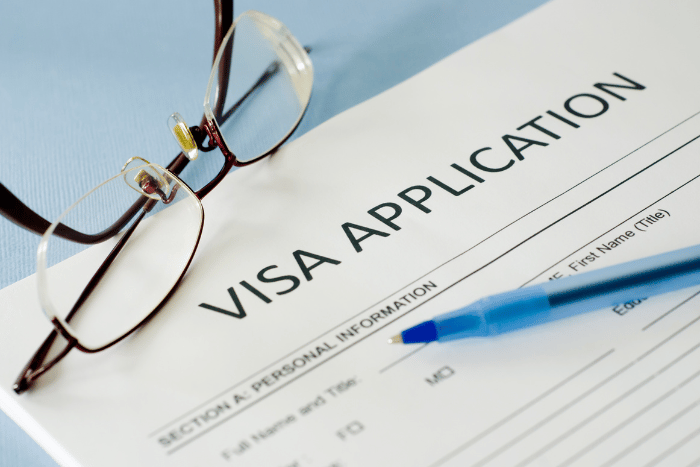Moving to the UAE capital soon? With over 60 choices, however, the visa application process in Abu Dhabi can get a bit confusing.
Fret not, we’ve simplified the process for you. Of course, it’s always important to recheck the processes on official government websites as laws keep changing over time.
First things first, GCC citizens do not require an Entry Visa or to be sponsored in order to enter the UAE. If you are a citizen of a GCC country, all you need is a passport or national ID to stay for up to 30 days.

For the rest, there are different routes when it comes to the visa application process in Abu Dhabi. A residence visa is the most common; however, there are several other options, including the most recent remote working visa.
A step-by-step guide to understanding the residence visa application process in Abu Dhabi
A Residence Visa is issued to people who are already in the country after entering the UAE on an Entry or Tourist Visa. It allows you to live and work in Abu Dhabi and can last from one to three years, depending on the sponsor. Long-term residence visas are available for either 5 or 10 years, subject to certain conditions.
Residence visa application process in the UAE
To obtain a residency visa in Abu Dhabi, the most common method is to be sponsored by a company or an individual. The sponsoring entity initiates the visa application process by obtaining an entry permit through the Federal Authority for Identity and Citizenship (ICP) online portal or the General Directorate of Residency and Foreigners Affairs (GDRFA).
Once the entry permit is issued, the applicant can then finalise the residency visa process, which often includes medical tests, fingerprinting, and the issuance of an Emirates ID.
An important thing to note when it comes to the visa application process in Abu Dhabi is the processing times. Depending on the type of visa as well, it can take anywhere between a week to even 14 days. So it’s important to collect all the required documents ahead of time and start the process as early as possible to avoid fines or any legal issues.
Another significant part of the visa application process in Abu Dhabi is document attestation, or the confirmation of the validity of signatures and seals. It is typically a time-consuming process that one should account for. In the UAE, the Ministry of Foreign Affairs (MoFA) attests documents digitally. Generally, these include birth and marriage certificates, educational certificates and/or commercial documents including contracts and agreements, trademark registrations and company closure documents.
For documents issued outside the UAE, the original will first be notarised and then attested by the MoFA in your home country. The document can then be attested by a UAE Embassy or Consulate in that country by applying through the UAE’s MoFA online channels.
What are the benefits of having a UAE residence visa?
In order to be able to live and work freely in the UAE, a residence visa is a must. You cannot get your EID without a visa, which is then required for all the basics like opening a bank account, getting your license, etc. Being a legit UAE resident will help you –
- Open a bank account
- Access financial facilities
- Apply for a driving licence
- Access government health services and health insurance
- Register his/her children in government and private schools
- Work and invest
- Travel visa–free to numerous destinations
Step-by-step Abu Dhabi visa application breakdown
1. Find a sponsor
- Employment: The most common route is through sponsorship by an employer. The employer initiates the process by applying for a work permit, which allows the individual to enter the UAE and begin the residency visa process.
- Family Sponsorship: A UAE resident can sponsor their family members (spouse, children, etc.).
- Property Ownership: Owning property in the UAE can also qualify an individual for a residency visa.
2. Entry Permit Application:
- The sponsor (employer, family member, etc.) applies for an entry permit through the ICP portal or the GDRFA website.
- This application requires various documents, including passport copies, photos, and potentially educational certificates.
3. Visa Processing:
- Once the entry permit is approved, the applicant must complete the necessary medical tests and fingerprinting.
- The applicant will then apply for the residency visa, providing the required documentation
- A recent coloured personal photo with a white background
- Passport copy
- Emirates ID Application receipt
- Tenancy contract
- A copy of the sponsor’s passport with a valid residence permit
- Job contract of the sponsor
- A medical fitness certificate (above 18 years)
- Entry permit
- Medical insurance or health card
- The visa application process in Abu Dhabi can be done through the ICP portal or GDRFA. The application is reviewed, and if approved, the residency visa is issued.
- A few days later, the applicant will receive their Emirates ID. You could also opt for the EID to be delivered to your doorstep for added convenience.
How much does the visa application process in Abu Dhabi cost?
Costs vary depending on the visa type, applicant’s nationality, and whether it’s a new application or renewal. A good estimate for the process would be AED 3,750 for a standard two-year employment visa renewal, including the visa and Emirates ID.
Renewing and cancelling your residence visa
For both renewal and cancellation, the process must be undertaken by your sponsor. UAE residents are granted longer flexible grace periods, at least up to 6 months (according to resident category), to stay in the country after the residence permit is cancelled or expires.
According to the new rules, visit, tourist and residence visa overstaying fees have been standardised at AED 50 per day. Those overstaying on a residency visa will have to pay AED 50 each day (AED 50 per day instead of AED 25).
Remember that when the visa expires, your Emirates ID card issued by the ICP also expires and will have to be renewed.
In order to cancel the visa, your sponsor would need to visit an ICP approved typing centre to fill up the cancellation form and have it processed. Or they could get it done via the website or application to make things easier.
Other temporary visa options to enter Abu Dhabi
Visa on Arrival
Citizens of these countries are not required to apply for an Entry Visa before arrival. Instead, an entry visa is issued automatically upon arrival. The same is valid for 30 days, with an extension of 10 days applicable.
The list is subject to change; therefore, it is advisable to check with the UAE embassy abroad or the airline before travelling to Abu Dhabi.
Entry Permit
An Entry Visa or Entry Permit is generally used as a broad term. It allows you to enter and stay in Abu Dhabi legally for a short period of time. Reasons typically include employment, visits, tourism, medical treatment, missions and conferences.
Most entry visas are valid for two months (60 days), but the duration depends on the type of Entry Visa.
In cases of entry visas for transit, the maximum number of days will be between four to six. Entry visas for employment allow you to stay in the country for 60 days, during which you must obtain a residence visa or apply for an extension.
All visas can be extended for 30 days twice without needing to leave and re-enter the country for renewal. If you fail to extend your entry visa and overstay, you will have to pay a fine of AED 100 per day, which is calculated from 10 days after the expiration date of the visa.

